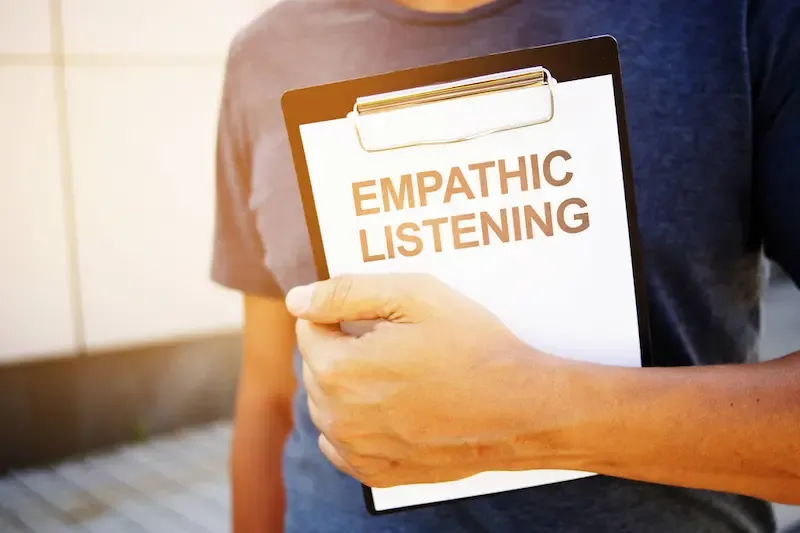Empaths, defined as individuals who possess a heightened sensitivity to the emotions and energies of others, often navigate a world that can feel overwhelming. According to a study published in *Psychological Science*, approximately 15-20% of the population identifies as empathic, leading them to experience emotions deeply and intensely. While this ability allows empaths to form genuine connections with people, it also presents significant challenges when it comes to asserting themselves. These challenges can manifest in difficulties setting boundaries, standing up for personal needs, or advocating for their own mental well-being.

Research shows that many empaths struggle with feelings of guilt or anxiety when attempting to assert themselves. Dr. Judith Orloff, a psychiatrist and author specializing in empathic concepts, states, “Empaths often fear they will hurt others by speaking their truth.” This fear can hinder their ability to express thoughts and emotions clearly, leaving them vulnerable in both personal and professional relationships. The ability to stand up for oneself is essential for emotional health and strong interpersonal dynamics. In this article, readers will discover seven powerful strategies designed specifically for empaths seeking to reclaim their voice and live authentically amid emotional turbulence. Understanding these techniques is not just beneficial but crucial for fostering resilience and empowerment.
Understanding Your Empathic Nature
Empaths possess unique strengths that set them apart, notably their deep intuition and the ability to sense the emotions of others. This heightened sensitivity can lead to extraordinary compassion and connection in relationships. According to a study published in “The Journal of Personality and Social Psychology,” individuals with strong empathic abilities often experience greater emotional awareness, which allows them to respond thoughtfully in social situations. Recognizing this strength is crucial for empaths as they navigate daily interactions, helping them leverage their abilities instead of feeling overwhelmed.

Accepting emotional responses without judgment is essential for empaths. It is common for these individuals to feel guilty or confused by their emotions, especially when those feelings seem disproportionate to external circumstances. For instance, an empath at a crowded party may feel intense anxiety or sadness due to the collective energy of the room rather than personal issues. Acknowledging these feelings as valid and part of their nature can empower empaths to understand themselves better. Mental health experts emphasize that embracing one’s emotions fosters self-acceptance, which serves as a vital foundation for personal growth.
Practicing self-awareness is another key strategy for empaths seeking to comprehend their nature more fully. Identifying triggers — situations or people that evoke strong emotional responses — is essential for managing sensitivity effectively. Journaling can be particularly beneficial; records of daily interactions and corresponding feelings can unveil patterns over time. For example, if an empath frequently feels drained after specific conversations, recognizing this pattern can prompt them to modify future engagements or establish boundaries with certain individuals. Mindfulness practices such as meditation also help enhance self-awareness by creating space for reflection on thoughts and feelings without immediate reaction.
By understanding their empathic nature through recognition of strengths, acceptance of emotions, and honing self-awareness skills, empaths lay the groundwork needed to stand confidently in their own truth while navigating a world that may not always understand them.
Setting Healthy Boundaries
Healthy boundaries are essential for empaths, as they define the limits of personal space, emotions, and energy. These boundaries act as protective shields against emotional drain and can prevent feelings of overwhelm that many empaths experience in their interactions. According to Dr. Judith Orloff, a psychiatrist and author specializing in empathic experiences, “Boundaries help you distinguish between your emotions and those of others.” This distinction allows empaths to maintain their mental health while engaging with the emotionally charged environments around them.
Establishing these boundaries begins with self-awareness and communication. Empaths should first identify specific situations that invoke discomfort or emotional exhaustion, such as demanding social events or constant requests from friends. Once recognized, it is crucial to communicate needs clearly to others. For instance, an empath may say, “I need some quiet time after our gathering to recharge.” By articulating these needs respectfully yet firmly, individuals create space for themselves without damaging relationships.

Maintaining healthy boundaries promotes positive mental health and contributes to stronger relationships. Research from the Journal of Family Psychology suggests that clear boundaries lead to increased trust and mutual respect within relationships. When empaths set limits on what they will tolerate — whether it’s emotional manipulation or excessive demands — they foster an environment conducive to open communication. As a result, relationships become more balanced and less draining for both parties involved.
Further, prioritizing personal space allows empaths to focus on self-care without guilt or shame. Taking dedicated time away from overstimulating environments enables reflection and relaxation. In doing so, individuals build resilience against stressors while enriching their connections with others through healthier engagement styles — a testament to the transformative power of setting meaningful boundaries.
Practicing Assertiveness
Assertiveness is a crucial skill for empaths, enabling them to communicate their needs and feelings effectively. To improve assertive communication skills, empaths can employ specific techniques such as using “I” statements. For example, instead of saying, “You always interrupt me,” an empath could say, “I feel unheard when interruptions occur.” This shift not only clarifies their feelings but also reduces defensiveness from the other party. According to mental health experts, expressing oneself clearly fosters healthy dialogue and mutual understanding.

Body language and tone play significant roles in assertiveness. Maintaining eye contact, standing tall, and using a calm but firm voice enhances the message being conveyed. Research indicates that non-verbal cues make up nearly 93% of communication effectiveness. Therefore, an empath who combines clear verbal expression with confident body language can more convincingly state their boundaries and needs. For instance, upon feeling overwhelmed during a group conversation, an empath might practice taking a deep breath before responding to steady their voice and maintain poise.
By asserting themselves more regularly, empaths can cultivate healthier relationships over time. When they express their thoughts or emotions without fear of conflict or rejection, it encourages openness in others as well. An empath may find that by stating what they need — be it time alone after socializing or sharing feelings about a project at work — they foster environments wherein all individuals are validated. The result is often improved connections built on trust and respect rather than misunderstandings or resentment.
Overall, practicing assertiveness equips empaths with tools to navigate interpersonal dynamics more effectively while honoring their needs as sensitive individuals. Strengthening these communication skills does not come overnight; however, with consistent effort and self-reflection, many empaths report feeling empowered in personal interactions — a vital step toward embracing authenticity in everyday life.
Managing Emotional Overwhelm
Empaths often experience heightened emotional sensitivity, making them more susceptible to feelings of overwhelm in various situations. To effectively navigate these challenging moments, employing self-soothing strategies becomes essential. Techniques such as deep breathing exercises and progressive muscle relaxation can help empaths ground themselves during emotionally intense episodes. For instance, taking a few minutes to inhale deeply through the nose and exhale slowly can induce a state of calm, helping to reduce anxiety levels.

Taking regular breaks is crucial for empaths who may find themselves drained after prolonged exposure to intense emotions or energy from others. Whether it’s stepping away from a busy workspace or taking time in nature, short intervals of downtime allow for mental recharging. Evidence suggests that even brief periods of withdrawal from overwhelming stimuli can enhance mood and creativity; according to a study published in the Journal of Positive Psychology, mindfulness breaks have been linked with improved emotional regulation among participants.
Mindfulness techniques also play an instrumental role in helping empaths regain clarity amidst chaos. Drawing attention to the present moment allows individuals to detach from external pressures and refocus their thoughts. Practices such as mindful meditation or simple grounding exercises — like observing surroundings or focusing on bodily sensations — can mitigate anxiety and restore balance. The National Center for Complementary and Integrative Health notes that mindfulness practices not only improve focus but also bolster resilience against emotional distress.
Incorporating these strategies into daily routines enables empaths to better manage their unique sensitivities while preserving their well-being. Proactively addressing emotional overwhelm empowers them to respond thoughtfully rather than react impulsively when faced with stressors. Ultimately, prioritizing techniques for self-care transforms challenges into opportunities for growth and understanding.
Seeking Support from Like-Minded Individuals
Connecting with fellow empaths can be a transformative experience. Empaths often feel isolated in their heightened sensitivity, which makes engaging with others who understand this unique perspective crucial. A supportive community not only validates feelings but also fosters shared experiences that enhance emotional resilience. According to a 2021 survey by the Empath Community Group, over 70% of its members reported feeling less stressed and more understood after participating in group discussions or support networks.
To find these communities, individuals can explore various online platforms such as Facebook groups, Reddit forums, and specialized empath websites. Local mental health organizations may also host support groups specifically for empaths. For example, the “Empaths Unite” meetup in Chicago gathers individuals on a monthly basis to share coping strategies and personal stories — participants often leave feeling empowered and connected. Engaging with like-minded peers provides empaths with tools for navigating their emotional landscapes while reducing feelings of loneliness.

Sharing experiences within supportive circles not only enhances personal growth but can also inspire others to embrace their empathic traits securely. Empaths often learn best through storytelling; hearing how others cope with similar challenges can lead to significant insights. For instance, someone might share the importance of setting boundaries while recounting an incident where they felt overwhelmed at work — a story that could motivate another participant facing similar struggles to take necessary steps for self-protection.
Ultimately, surrounding oneself with empathetic individuals strengthens resilience against external pressures encountered daily. Whether through online interactions or face-to-face meetings, fostering these connections is vital for personal well-being. The encouragement received from community engagement can empower empaths not just to stand up for themselves but also to thrive in their journey toward emotional fulfillment.
Developing a Self-Care Routine
Creating an effective self-care routine is crucial for empaths who often bear the emotional weight of those around them. Essential elements of such a plan include mindfulness, relaxation techniques, and activities that foster creativity. Mindfulness practices, such as meditation or deep-breathing exercises, enable empaths to ground themselves and reconnect with their inner selves. Research indicates that regular mindfulness practice can reduce anxiety levels by up to 32%, making it a valuable tool for emotional regulation.

Engaging in creative pursuits, whether it be painting, writing, or crafting, offers another vital outlet for empaths. These activities not only provide an escape but also allow individuals to express their emotions constructively. A study published in *Psychological Science* revealed that engaging in creative activities can significantly boost mood and enhance overall well-being. For example, dedicating an afternoon to sketching at a local park can rejuvenate one’s spirit while providing a peaceful environment away from daily stressors.
Nature walks are another powerful component of a self-care routine tailored for empaths. Spending time outdoors has been shown to decrease cortisol levels—the hormone associated with stress — thus promoting feelings of tranquility and connection to the earth. Studies conducted by the University of Exeter indicate that just 120 minutes per week spent in nature can lead to improved mental health. Even short strolls around the neighborhood can help recharge energy levels and restore emotional balance.
Prioritizing personal well-being is paramount for empaths who often prioritize others’ needs above their own. Incorporating dedicated time each day for self-care fosters resilience against emotional depletion. Simple acts like journaling thoughts or soaking in a warm bath create much-needed space for introspection and relaxation. As artist Maya Angelou once said, “I’ve learned that people will forget what you said, people will forget what you did, but people will never forget how you made them feel.” By taking care of themselves first, empaths become better equipped to uplift those they encounter without sacrificing their own vitality.
Embracing Personal Growth
Personal growth is a vital aspect of the empathic experience. Challenges faced by empaths, such as emotional overwhelm or difficulties in assertiveness, can serve as stepping stones toward greater self-awareness and resilience. Viewing these challenges not as setbacks but as opportunities for transformation is key to personal development. For instance, an empath who struggles with boundaries may find that setting them leads to healthier relationships, reinforcing their sense of identity and strength.
Several resources cater specifically to empaths looking to enhance their personal growth journey. Books like “The Empath’s Survival Guide” by Judith Orloff provide practical strategies for navigating daily life while honoring one’s sensitivities. Workshops focused on emotional intelligence and assertive communication are increasingly available online, offering empaths tools they can adapt to their own situations. These resources often emphasize community learning, allowing individuals to share insights that further enrich the collective experience.

Success stories abound among the empath community, showcasing how overcoming obstacles leads to empowerment. Take the example of Sofia, who learned to embrace her heightened sensitivity by pursuing artistic endeavors after years of feeling overwhelmed in social settings. She began writing poetry based on her experiences, ultimately publishing a collection that resonated with many others facing similar challenges. Sofia’s journey exemplifies how embracing one’s unique traits can lead not only to personal fulfillment but also inspire others.
As empaths lean into their potential for growth, they foster authenticity in themselves and encourage those around them to do the same. Every step taken toward understanding and evolving one’s strengths can cultivate a deeper connection with oneself and create pathways toward resilience in everyday interactions. This process solidifies the belief that challenges are not roadblocks — rather, they are vital elements in the continuous journey of self-discovery and empowerment.
Building Resilience as an Empowered Empath
Standing up for oneself is crucial for empaths in navigating a world that can often feel overwhelming. By understanding their own sensitivities and establishing boundaries, empaths not only protect their mental health but also foster healthier relationships. Research shows that individuals who practice assertiveness report higher self-esteem and reduced stress levels. According to a study published in the Journal of Emotional Health, establishing personal boundaries significantly contributes to improved emotional well-being.
Applying the strategies discussed — such as managing emotional overwhelm, seeking support, and developing a self-care routine — can empower empaths to thrive in their environments. Consistency is key; by regularly implementing these practices, empaths can cultivate resilience and authenticity in daily life. As one empath noted, “Embracing my sensitivity has transformed it from a vulnerability into my greatest strength.” With commitment and patience, empaths can create fulfilling lives while honoring their unique nature.





